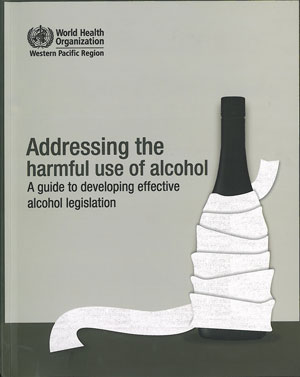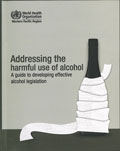WHO Western Pacific Region relases guide:
Developing effective alcohol legislation
Many governments realize the need for effective legislation to reduce the harm from alcohol use. This is also reccommended by the World Health Organization (WHO) Global strategy to reduce the harmful use of alcohol. But how to do it? WHO Western Pacific Regional Office has offered a guide.
 The purpose of the legislation guide is to assist government agencies and ministries in developing country-level legislation to implement, monitor and enforce effective alcohol policies.
The purpose of the legislation guide is to assist government agencies and ministries in developing country-level legislation to implement, monitor and enforce effective alcohol policies.
The guide provides advice on approaches to alcohol regulation to support development of effective legislation appropriate to each country. It provides practical advice based on international experience about the implications of legislative options, steps to be taken to implement legislation and best practice on how to enforce legislation and support compliance.
The authors do not attempt to draft standard legislative provisions for all countries as requirements will differ, perhaps considerably, based on local circumstances and existing regulatory frameworks. Instead, the guide draws on alcohol legislation in a range of countries to formulate suggestions for possible legislative wording. The examples are drawn from the Western Pacific region, but would be valuable for readers also in other parts of the world.
The policy options covered are taxation and pricing, regulating the sale of alcohol to the public, minimum age restrictions, alcohol marketing and drink driving.
Order or download the guide from the WHO WPRO web site:
RELATED ARTICLES
- New report highlights benefits of policy measures to prevent harmful alcohol consumption
- WHO consultation on global alcohol strategy and the way forward
- Alcohol use - a barrier to health and to the achievement of the SDGs
- Government investments in alcohol industry up against the wall
- Abstracts for GAPC 2020 – deadline 29 July 2019
- A regional African alcohol coordination mechanism is needed
- New book reveals a series of unethical business practices by Heineken in Africa
- SAAPA applauds WHO position on no industry collaboration
- Next GAPC to be held in Dublin in March 2020
- SAFER – a new WHO initiative to boost national alcohol policy processes

